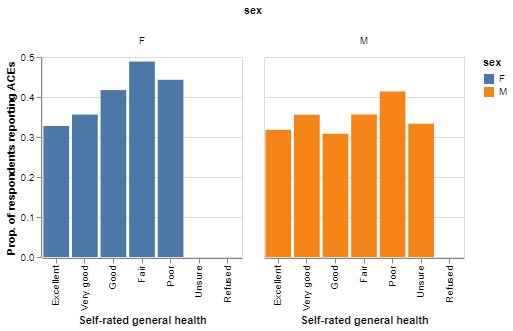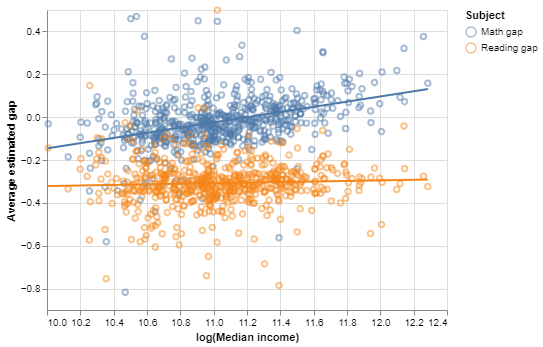Course introduction
Follow along: https://ruizt.github.io/pstat100
Invalid Date
Attendance form
Case studies: a preview
Case study 1: ACE and health

Association between adverse childhood experiences and general health, by sex.
Case study 1: ACE and health
You will:
- process and recode 10K survey responses from CDC’s 2019 behavior risk factor surveillance survey (BRFSS)
- cross-tabulate health-related measurements with frequency of adverse childhood experiences
Case study 2: SEDA

Education achievement gaps as functions of socioeconomic indicators, by gender.
Case study 2: SEDA
You will:
- merge test scores and socioeconomic indicators from the 2018 Standford Education Data Archive by school district
- visually assess correlations between gender achievement gaps among grade schoolers and socioeconomic indicators across school districts in CA
Case study 3: Paleoclimatology

Sea surface temperature reconstruction over the past 16,000 years.
Case study 3: Paleoclimatology

Clustering of diatom relative abundances in pleistocene (pre-11KyBP) vs. holocene (post-11KyBP) epochs.
Case study 3: Paleoclimatology
You will:
- explore ecological community structure from relative abundances of diatoms measured in ocean sediment core samples spanning ~15,000 years
- use dimension reduction techniques to obtain measures of community structure
- identify shifts associated with the transition from pleistocene to holocene epochs
Case study 4: Discrimination at DDS?

Apparent disparity in allocation of DDS benefits across racial groups.
Case study 4: Discrimination at DDS?

Expenditure is strongly associated with age.
Case study 4: Discrimination at DDS?

Correcting for age shows comparable expenditure across racial groups.
Case study 4: Discrimination at DDS?
You will:
- assess the case for discrimination in allocation of DDS benefits
- identify confounding factors present in the sample
- model median expenditure by racial group after correcting for age
About the course
Scope
This course is about developing your data science toolkit with foundational skills:
- Core competency with Python data science libraries
- Critical thinking about data
- Visualization and exploratory analysis
- Application of basic statistical concepts and methods in practice
- Communication and interpretation of results
What’s unique about PSTAT100?
There are a few distinctive aspects:
- multiple end-to-end case studies
- question-driven rather than method-driven
- emphasis on project workflow
- data storytelling and communication
Limitations
There are also some things we won’t cover:
- Predictive modeling or machine learning
- Algorithm design and implementation
- Techniques and methods for big data
- Theoretical basis for methods
Weekly Pattern
We’ll follow a simple weekly pattern:
- Mondays
- Lecture
- Sections
- Assignments due 11:59pm PST
- Wednesdays
- Lecture
- Late work due 11:59pm PST
Course pages & materials
- Materials via course website ruizt.github.io/pstat100
- Computing at pstat100.lsit.ucsb.edu
- Assignments/gradebook at Gradescope
- Discussion board (TBA)
Tentative schedule
| Week | Topic | Lab | Homework | Project |
|---|---|---|---|---|
| 1 | Data science life cycle | |||
| 2 | Tidy data | L0 | ||
| 3 | Sampling and bias | L1 | ||
| 4 | Statistical graphics | L2 | H1 | |
| 5 | Kernel density estimation | L3 | MP1 | |
| 6 | Principal components | L4 | H2 | |
| 7 | Simple regression | MP2 | ||
| 8 | Multiple regression | L5 | H3 | |
| 9 | Classification and clustering | CP1 | ||
| 10 | Case study | H4 | ||
| 11 | Finals week | CP2 |
Assessments
- Labs introduce and develop core skills
- Homeworks apply core skills to case studies
- Projects practice creative problem-solving
Policies
- Communication
- If you have questions, please come to office hours
- Avoid email except for personal matters
- Deadlines and late work
- One-hour grace period on all deadlines
- 48-hour late submissions
- Two free lates on any assignment (except last assignment)
- 75% partial credit thereafter for late work
Policies
- Grades
- Roughly 10-20-30-40 attendance-labs-homeworks-projects
- Final weighting and grade assignment at instructor’s discretion
- Do not expect 92+% = A, 90-92% = A-, 87-89.9 = B+, etc.
- A’s are awarded sparingly and indicate exceptional work
Other info
- Informal section swaps are allowed with TA permission
- Attendance required at all class meetings, but a few absences without notice are okay
- Honors contracts not available this quarter
- Office hours start week 2, check website for schedule
Getting started
- Lab this week will introduce you to computing and course infrastructure
- Please fill out intake survey ASAP
- Check access to Gradescope, LSIT, course page
- Review syllabus